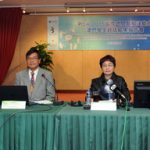On 21st November, the assessment results of the Programme of International Student Assessment (PISA) 2015 Collaborative Problem-solving (CPS) study will be released. This study is hosted by the Organization for Economic Cooperation and Development (OECD). There are a total of 51 countries/economies participating in the PISA 2015 CPS, including 32 OECD countries and 19 partner economies. In PISA 2015, scientific literacy is the major domain of assessment, whereas mathematics, reading and CPS are the minor domains. The PISA 2015 findings on scientific, mathematical and reading literacy have been disseminated to the public in December last year. What is disseminated today focuses on the CPS of 15-year-olds in comparative education perspective.
This is the first time in the history of PISA to assess CPS as one of the most pertinent 21st century skills. The emphasis of CPS assessment is to find out how competent are students able to collaborate and communicate with peers to solve problems encountered in daily life. In the analyses of student CPS competence, the focus is not on how individual student mobilizes cognitive resources to solve problems on their own. PISA 2015 CPS is a digital assessment. Through chat-based conversations with virtual agents, examinee communicates and cooperates with them in an interactive manner. Every piece of the details of the CPS processes will be recorded automatically by the test delivery system, and the big data collected in the form of log files will be analyzed in order to arrive at a grading of CPS proficiency level of the examinee. There are detailed descriptions of each CPS proficiency level, highlighting how student of that level teams up with peers, manages conflicts, establishes consensus, and monitors teamwork progress in the CPS process.
The PISA 2015 CPS results show that Macao-China students perform very well (mean = 534). Amongst the 51 participating economies, Macao-China ranks 8th in the league table, statistically significantly higher than the average of the OECD countries (mean = 500). Additionally, more than 85% of the Macao students whose CPS proficiency are assessed beyond the baseline level (=2). This is indicative of Macao students’ excellent CPS ability in global perspective. Considering all the four literacies assessed in PISA 2015, there is only a very small percentage (=2.9%) of Macao students not reaching the baseline level. Hence, Macao’s basic education system ensures that its students are equipped with the four basic literacies to participate in the daily life of the 21st century.
The PISA 2015 findings reveal that in all participating countries/economies females outperform males in CPS ability. For Macao, like all participating economies in PISA 2015, females outperform males statistically significantly by 38 score points. However, in comparative education perspective, Macao’s gender difference in CPS is relatively greater than most other economies. It is noteworthy that PISA 2015 CPS pays a lot of attention on interpersonal communication and collaboration amongst peers. Females are better than the males in CPS performance. This may be attributed to their superiority in language ability, as well as personality characteristics advantageous to the females.
Table: Mean performance of the four PISA 2015 fundamental literacies of some referenced countries/economies
As seen in the performance league table of the core literacies assessed in PISA 2015, Macao’s rank is at the top positions amongst the participating countries/economies. This shows that after the return of Macao to its motherland in 1999, through the efforts of the stakeholders, Macao’s basic education system is able to educate high-performing students with admirable success.
If Macao is to maintain its competitive edge in the Greater China Region, there is a need to invest more efforts in the build-up of CPS ability in our students. Cooperation and collaboration are core skills developed through daily practices of interaction with others. CPS is not a skill taught in specific school subjects, but is generally integrated in student learning activities, or it is immersed in the workplace and living environment. Hence, it is of paramount importance in our future education system to build up a platform for students to practice core skills of interpersonal relationships, rendering them opportunities to collaborate with teammates to solve problems. Admittedly, CPS emerges to be one of the most pertinent 21st skills needed inculcation for our next generation.


